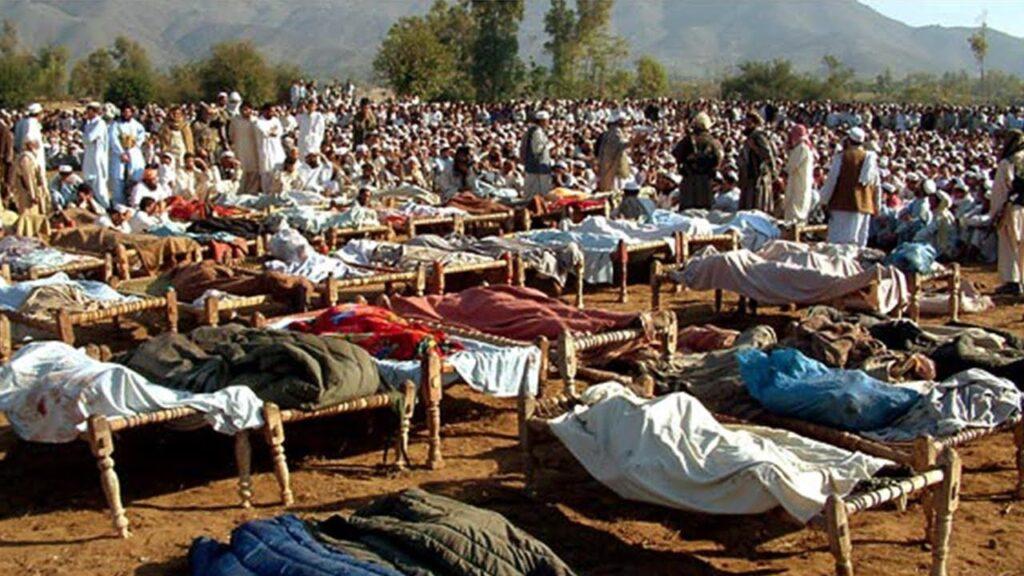The recent tragic attack in Bajaur has shaken Pakistan, claiming the lives of 64 people and leaving over 100 injured. This gruesome incident has not only caused widespread grief but also raised concerns about the ongoing security situation and the complex dynamics between various militant groups in the region.
The suicide attack, which targeted the religious-political party Jamiat e Ulema e Islam (JUIF) in Bajaur, has garnered condemnation from unexpected quarters. Both the Afghan Taliban, al-Qaeda and the outlawed Tehrik-i-Taliban Pakistan (TTP), known for its history of carrying out terrorist attacks within Pakistan, expressed disapproval of the attack. This alignment of interests adds a layer of complexity to an already intricate situation.
What stands out is that this attack marked the first significant strike carried out by the Islamic State of Khorasan (ISKP) in the region. The emergence of ISKP as a prominent player in this attack adds another layer of concern to the security landscape.
The history of targeting JUIF leaders and gatherings in Bajaur is not new. Israr Madani, a religious scholar and expert on militancy, pointed out that approximately 18 JUIF leaders had previously been targeted in the same region. This pattern contrasts with the rest of Khyber Pakhtunkhwa, where such phenomena have been relatively uncommon. The question arises: what makes Bajaur unique in this regard?
Bajaur’s proximity to Afghanistan’s Kunar province, a known stronghold of ISKP, provides crucial context. When ISKP emerged, Kunar became a focal point for the group’s activities and leadership. Conversely, Afghan Taliban’s efforts to counter ISKP’s influence prompted collaboration with JUIF, leading to joint operations against ISKP. This entanglement has intensified the conflict’s complexities, making the region susceptible to retaliatory attacks.
The impact of the Bajaur attack on Khyber Pakhtunkhwa’s security is undeniable. Maulana Khan Zeb Khan, a local political leader from the Awami National Party, voiced concerns over the incident’s repercussions. The attack has eroded faith in the state’s ability to maintain peace, prompting calls for collective action.
With 17 out of 18 suicide attacks taking place in Khyber Pakhtunkhwa, the situation is alarming. To address this menace, a joint approach involving Pakistan and neighboring Afghanistan is crucial. The forthcoming “Aman” (Peace) rally scheduled for August 14th in Bajaur symbolizes this collective resolve. Political, civil, and religious leaders will gather under white flags to emphasize unity against terrorism.
Sami Yousafzai, a senior Afghan journalist, emphasizes the need for caution. The shift in dynamics since the Taliban’s takeover in Afghanistan is profound. Pakistan’s threats of carrying out attacks inside Afghanistan risk igniting a full-scale conflict with the Afghan Taliban. This stance contrasts with historical relations and carries the potential for significant repercussions. The promises and statements made by the Afghan side should be carefully evaluated, as political posturing might be at play. Engaging with the Kandahar group of the Afghan Taliban and ensuring a realistic understanding of the situation is crucial for Pakistan. In this complex landscape, Pakistan’s approach to the Afghan Taliban government requires careful consideration.
The Bajaur attack has unveiled intricate dynamics among militant groups and underlined the urgency for collective action. The security situation in Khyber Pakhtunkhwa demands a unified stance, not only within Pakistan but extending to cooperation with Afghanistan. In these trying times, cautious diplomacy and collaboration are essential to navigate the complexities of the region’s evolving landscape.


